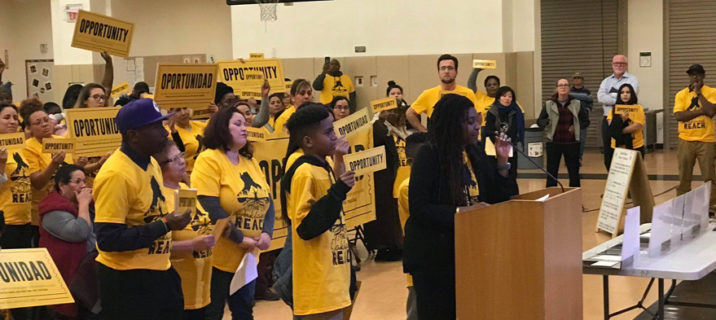Closing public schools hurts some families. Those families at the closing school bear the burden of the failures of adults to make either short term of long-term decisions, or to faithfully implement them for children. And they likely never see any concrete benefit from the district saving money. The pain from school closures are felts acutely by a small minority and the benefits are dispersed widely throughout the district.
The Opportunity Ticket (OT), is a parent revolution, that sought to inject some equity into this equation. Giving those most disadvantaged families a real shot of getting into the school of their choice. So even in losing they might still win.
We know whose schools tend to close and that those families tend to have the least options. The Opportunity Ticket broke the redlined enrollment rules and promised that students at closing schools, charter or district, would get a better chance at getting into the school of their choice, regardless of where they could afford to live.
Whether that promise remains true will depend on the OUSD Board, who is reviewing the rules for the OT’s implementation at the next board meeting.
Trusting the Process and Being Honest about it
Mind you a district working group met multiple times for hours at a time and made “near unanimous“ recommendations on who gets the Opportunity Ticket, after looking at reams of data and robust discussions. But as we have heard time and time again, and most recently from the grand jury, OUSD is a “district of exceptions.”
So even though a working group was formed, it studied the facts, heard from staff and made decisions, all of that is discarded on the whim of a Board member, who never talked to anyone, or read the background materials. The process is ignored, and folks just shoot from the hip at their targets of choice.
This is the OUSD dysfunction, where decisions are largely driven by individual relationships and agendas, rather than process or policy, and they are certainly not driven by families.
A Working Group that Worked
I was on the opportunity ticket working group and we prioritized the families who were paying the costs. It was not about schools or systems, but prioritizing families. That should be the business of the district, prioritizing the most underserved families. So, whether that was a district school closing or a charter school closing, those families were still families that we should care about, and work to help.
I know folks on the working group (particularly the OUSD principals) were surprised to hear they were “pro charter” as Director Torres described them. You can see the list here. 8 voting members, 2 district principals, 3 parents of district children, 1 parent of a charter and district child, a non profit leader who does youth empowerment and myself.
Hardly a charter heavy committee—a group that is heavy on caring for children and families who are displaced yes—charter heavy—no. For some of us, the focus is on children and not politics. I wish and hope that the OUSD Board would take a lesson.
The OT is only a First Step, and not the Last One
I applaud the district for taking a look at more comprehensive enrollment reform. We need to undo the lines of demarcation that history has written. But this is not the time for directors to impose their own personal preferences. It is time to help these displaced families find a place that works for them. And show the community that the costs of restructuring won’t be thrown exclusively on the families who can least afford to bear them.
And we need to start and move forward with action on the broader conversation about enrollment rules, and access to quality schools for underserved families.
Finally, it is time, as the Grand Jury stated, to move from a system where folks in OUSD ask, “what’s in it for me?” To one where they ask, “how can we help the kids?” And unless you are that 1% of extreme haters on either side—you don’t see district kids or charter kids, when a school is closed and children are displaced—you see kids in need, and you work to help them.
Or at least you should.

